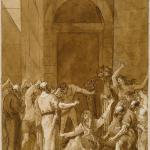
Evangelical Protestantism (which I was an enthusiastic part of from 1977-1990, and retain many many fond memories of and gratefulness for) is known for having lots of slogans and catch-phrases and mantras that are repeated over and over as if they are Gospel Truth. One of these is: “Christianity isn’t a religion. It’s a relationship.”
I used to resonate with this sentiment quite a bit myself, but I never took it as far as many people do (I hardly could have: having obtained a college degree in sociology). I would have still said, if asked: “Christianity is one of the world’s religions, and the one that is the most true.” I’d like to unpack this famous saying a bit.
I found a great article on this topic by a United Methodist pastor named Jimmy Mallory, entitled, “It’s Not a Religion, It’s a Relationship, Right?” (Firebrand, 9-14-20). It will serve as a useful introduction to what I want to say. He observed:
The popular slogan certainly has truth in it, but it’s not the complete truth. In fact, I find it exasperating. . . .
It . . . gave me a reason to shrug away an annoyance: I no longer need to align myself with religious baggage that may make me seem weird, intolerant, and hateful. . . . I could have the best of both worlds because I could still have my faith without the baggage of religion. It was plain to me that there was something about Christianity not being associated with religion that somehow made it more accessible and palatable. . . .
“Ritual” is not a bad word. Neither is “religion.” They are simply the ways by which humanity can relate to God. Everyone utilizes ritual. Many have their own daily rituals. Some wake up in the morning to the sound of an alarm clock, get ready for the day, go to the kitchen for breakfast and coffee, send the kids off to school, and then head to work, where more rituals await. We have prescribed formulas in which we go about our daily routines, and if one thing is out of place, it could ruin the whole day. Our daily rituals keep our lives organized.
The same can be said for religious ritual. Every church service is full of ritual, whether we recognize it as such or not. Praying, singing, the preaching of the Word, partaking in the sacraments, even the day we choose to attend worship, the church service is determined by these formulaic routines that help us to connect with God. They create order. One can even say that ritual is Godly because that’s what God does; God brings order out of chaos. Religion, then, is built upon the rituals utilized by Christians to keep an orderly faith-life. . . .
In the case of the Pharisees, Jesus took issue with the appearance of religion. His concern was with those who act religious but lack the love of God for their neighbors. Without the heart of the law, religion is relegated to a show. We are just pretty tombs filled with death and decay, no better than our natural state apart from the grace of God.
Empty religion and spiritual death is a legitimate concern for all Christians. . . .
By definition, a relationship requires a mutual connectedness. . . . it’s true that we can do nothing on our own to earn our salvation. However, by God’s grace at work in our lives, we can respond. And the practices by which we respond are collectively called “religion.” It makes our mutual connectedness complete. The formula is Grace + Religion = A Relationship with God. This is how relationships work; by doing our part to maintain a healthy and life-giving connection. Our part in our response is “attending to the ordinances of God.” God comes to us in grace. We go to God in religion. Together, we form a relationship that puts all other relationships into right-relatedness.
This is dead-on, and I especially like it because it shows that this understanding is not simply a Catholic one, but a concept where Catholics and Protestants ought to be able to fully agree. And we can and should because, as I will shortly demonstrate, the Bible itself doesn’t pit these two valuable and altogether necessary things (relationship with God and religion) against each other.
I ran across a meme along these lines from “God TV”. It stated: “Jesus did not die to give us a religion. He died so that through faith in Him we could have an intimate relationship with God.” This is classic example of what we might call “evangelical folk piety.” It’s well-intentioned, rightly promotes the very important truth of having a relationship with God (which is wonderful and needed), but at the same time it blasts “religion” as if it were inherently, intrinsically, essentially a bad thing through and through: some sort of sin. It “throws the baby out with the bath water”, so to speak.
All “religion” means is to “observe” or “bind.” All Christians certainly “observe” many things. Almost all of us believe in baptism and receiving Holy Communion. That’s ritual and it’s religion. Jesus even said that receiving the Holy Eucharist is directly tied to salvation, and the Bible teaches that baptism is, too. We sing hymns in Church. That’s a ritual of worship. We bow our heads together to pray. Sometimes we kneel. Etc. All of this is “religion.” We should feel no need to pit it against faith and knowing God.
*
1 Timothy 2:10 (RSV) but by good deeds, as befits women who profess religion.
1 Timothy 3:16 Great indeed, we confess, is the mystery of our religion: He was manifested in the flesh, vindicated in the Spirit, seen by angels, preached among the nations, believed on in the world, taken up in glory.
2 Timothy 3:1-5 But understand this, that in the last days there will come times of stress. [2] For men will be lovers of self, lovers of money, proud, arrogant, abusive, disobedient to their parents, ungrateful, unholy, [3] inhuman, implacable, slanderers, profligates, fierce, haters of good, [4] treacherous, reckless, swollen with conceit, lovers of pleasure rather than lovers of God, [5] holding the form of religion but denying the power of it. Avoid such people.
James 1:26-27 If any one thinks he is religious, and does not bridle his tongue but deceives his heart, this man’s religion is vain. [27] Religion that is pure and undefiled before God and the Father is this: to visit orphans and widows in their affliction, and to keep oneself unstained from the world.
Acts 17:22 So Paul, standing in the middle of the Are-op’agus, said: “Men of Athens, I perceive that in every way you are very religious.
1 Timothy 5:4 If a widow has children or grandchildren, let them first learn their religious duty to their own family and make some return to their parents; for this is acceptable in the sight of God.
*
Martin Luther: Strong Elements in His Thinking of Theosis & Sanctification Linked to Justification [11-23-09]
Trusting God as an Element of Faith & Discipleship [1-8-10]
Biblical Evidence for True Apostolic Tradition (vs. “Traditions of Men”) [6-23-11]
Informal Worship vs. Formal Catholic Liturgy [3-4-13]
“In Him” An Expression of the Oneness of Theosis? [3-13-14]
Theosis / Deification / Divinization in Western Spirituality [2015]
“Personal Relationship with Jesus”: Good Catholic Phrase? and Practice? [8-15-15]
Bible on Wholehearted Formal Worship [6-4-07; revised and expanded 1-22-16]
“Personal Relationship” vs. “Join the One Church”? [2-3-16]
The Rosary: “Vain Repetition” or Biblical Devotion? [5-24-16]
Is the Rosary Christ-Centered? [5-25-16]
Ritualistic, Formal Worship is a Good and Biblical Practice [National Catholic Register, 12-4-16]
Tradition is Not a Dirty Word — It’s a Great Gift [National Catholic Register, 4-24-17]
“Personal Relationship with Jesus” — A Catholic Concept? [National Catholic Register, 2-19-18]
The Rosary: ‘Vain Repetition’ or Biblical Prayer? [National Catholic Register, 3-16-18]
Biblical Evidence: Personal Relationship with Jesus [2013; expanded on 1-18-19]
***
Photo credit: tamara_cox1 (7-7-11) [Flickr / CC BY-SA 2.0 license]
***
Summary: Evangelical Protestantism has lots of slogans & catch-phrases & mantras. One of these is: “Christianity isn’t a religion. It’s a relationship.” I show how it is a half-truth & quite unbiblical.













